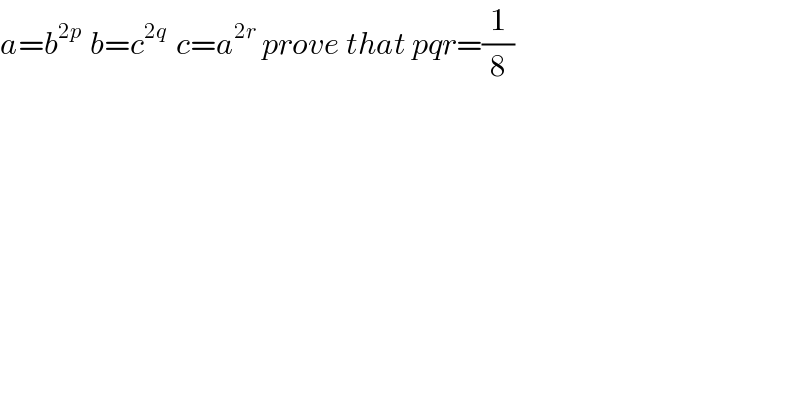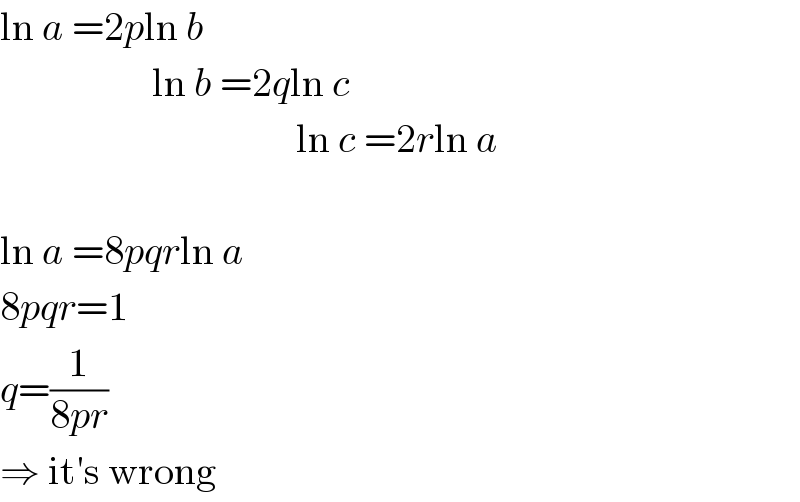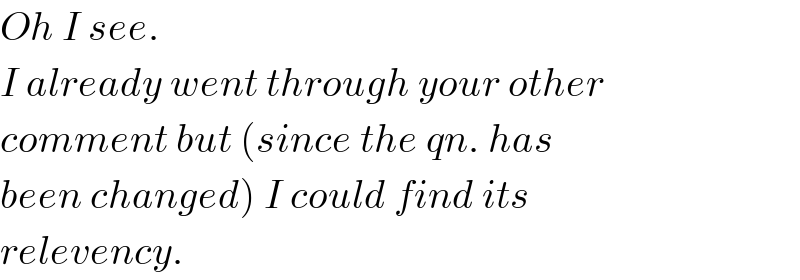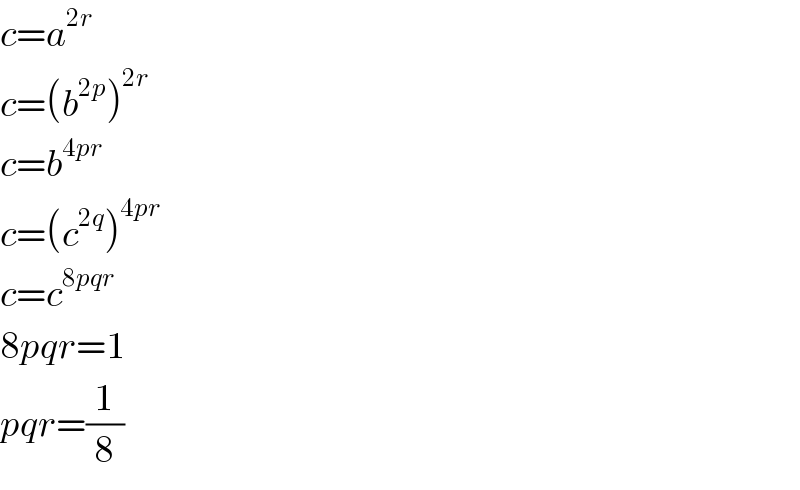
Question Number 59727 by muneshkumar last updated on 14/May/19

$${a}={b}^{\mathrm{2}{p}\:\:} {b}={c}^{\mathrm{2}{q}\:} \:{c}={a}^{\mathrm{2}{r}} \:{prove}\:{that}\:{pqr}=\frac{\mathrm{1}}{\mathrm{8}} \\ $$
Answered by MJS last updated on 13/May/19

$$\mathrm{ln}\:{a}\:=\mathrm{2}{p}\mathrm{ln}\:{b} \\ $$$$\:\:\:\:\:\:\:\:\:\:\:\:\:\:\:\:\:\:\:\mathrm{ln}\:{b}\:=\mathrm{2}{q}\mathrm{ln}\:{c} \\ $$$$\:\:\:\:\:\:\:\:\:\:\:\:\:\:\:\:\:\:\:\:\:\:\:\:\:\:\:\:\:\:\:\:\:\:\:\:\:\mathrm{ln}\:{c}\:=\mathrm{2}{r}\mathrm{ln}\:{a} \\ $$$$ \\ $$$$\mathrm{ln}\:{a}\:=\mathrm{8}{pqr}\mathrm{ln}\:{a} \\ $$$$\mathrm{8}{pqr}=\mathrm{1} \\ $$$${q}=\frac{\mathrm{1}}{\mathrm{8}{pr}} \\ $$$$\Rightarrow\:\mathrm{it}'\mathrm{s}\:\mathrm{wrong} \\ $$
Commented by $@ty@m last updated on 14/May/19

$${q}=\frac{\mathrm{1}}{\mathrm{8}{pr}}\:\equiv\frac{\mathrm{1}}{\mathrm{8}}={pqr} \\ $$$${what}'{s}\:{wrong}? \\ $$
Commented by MJS last updated on 14/May/19

$$\mathrm{the}\:\mathrm{question}\:\mathrm{has}\:\mathrm{been}\:\mathrm{changed}\:\mathrm{after}\:\mathrm{I}\:\mathrm{gave} \\ $$$$\mathrm{my}\:\mathrm{answer}\:\left(\mathrm{look}\:\mathrm{at}\:\mathrm{my}\:\mathrm{other}\:\mathrm{comment}\right) \\ $$
Commented by $@ty@m last updated on 14/May/19

$${Oh}\:{I}\:{see}. \\ $$$${I}\:{already}\:{went}\:{through}\:{your}\:{other} \\ $$$${comment}\:{but}\:\left({since}\:{the}\:{qn}.\:{has}\:\right. \\ $$$$\left.{been}\:{changed}\right)\:{I}\:{could}\:{find}\:{its} \\ $$$${relevency}. \\ $$
Answered by MJS last updated on 14/May/19

$$\mathrm{the}\:\mathrm{given}\:\mathrm{formulas}\:\mathrm{are}\:\mathrm{symmetric}\:\mathrm{but} \\ $$$${q}=\frac{\mathrm{2}{pr}}{{p}+{r}}\:\mathrm{is}\:\mathrm{not}.\:\left({q}=\frac{\mathrm{2}{pr}}{{p}+{r}}\:\Leftrightarrow\:{p}=\frac{{qr}}{\mathrm{2}{r}−{q}}\:\Leftrightarrow\:{r}=\frac{{pq}}{\mathrm{2}{p}−{q}}\right) \\ $$$$\Rightarrow\:\mathrm{it}\:\mathrm{cannot}\:\mathrm{be}\:\mathrm{universally}\:\mathrm{true} \\ $$
Answered by tanmay last updated on 14/May/19

$${c}={a}^{\mathrm{2}{r}} \\ $$$${c}=\left({b}^{\mathrm{2}{p}} \right)^{\mathrm{2}{r}} \\ $$$${c}={b}^{\mathrm{4}{pr}} \\ $$$${c}=\left({c}^{\mathrm{2}{q}} \right)^{\mathrm{4}{pr}} \\ $$$${c}={c}^{\mathrm{8}{pqr}} \\ $$$$\mathrm{8}{pqr}=\mathrm{1} \\ $$$${pqr}=\frac{\mathrm{1}}{\mathrm{8}} \\ $$
